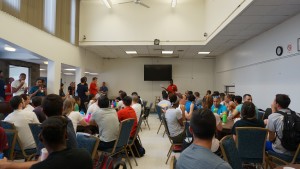EM Categorical: Didactics
 Emergency medicine is uniquely challenging because of the breadth of material its practitioners are expected to master. The most valuable learning experiences in medicine occur at the patient’s bedside. However, these experiences need to be supplemented with regular readings and a formal didactic curriculum to ensure that residents develop without knowledge gaps.
Emergency medicine is uniquely challenging because of the breadth of material its practitioners are expected to master. The most valuable learning experiences in medicine occur at the patient’s bedside. However, these experiences need to be supplemented with regular readings and a formal didactic curriculum to ensure that residents develop without knowledge gaps.
We are continually incorporating new and innovative education techniques into our curriculum each academic year. Our weekly conference is 4 hours every Wednesday morning and is supplemented by a diverse individualized interactive instruction (triple I) program to ensure all topics are covered while addressing the different needs and learning styles of all residents.
Additionally, our curriculum is covered in modules that allow for in-depth understanding and review of the pathology related to each organ system. A strong emphasis is placed on evidence-based medicine through case-based learning sessions and triple I activities. Residents and faculty share responsibility for the preparation of these conferences. This provides residents an opportunity to research topics deeply and become comfortable organizing and presenting lectures to large groups. The curriculum has been organized so that the core-content of emergency medicine is covered biannually.
Lecture Series
Click an item below for more information
- Residents work in teams to develop clinical scenarios and related questions on core emergency medicine topics. They then find current literature to answer these questions. During conference, these questions are used to drive faculty led small group discussions. This leads to the use and awareness of current literature, increased exposure to faculty for in-depth discussions, and a more interactive format for learning
- Lectures are given by directors of various divisions within the department of emergency medicine. This gives our leaders the opportunity to pass on valuable knowledge gained through many years of experience.
- Breakout small group sessions to discuss bread and butter EM topics with faculty facilitators. Each session is then wrapped up with a short resident run session with board style questions.
- These are ten minute lectures based on recent clinical encounters. The goal of each ten minute lecture is to teach one important point. Not only is this an effective way to learn, it also teaches residents to be efficient when presenting.
- Cases from our own department are used to drive in-depth lectures on various critical care topics. This series is always well liked and helps solidify the lessons we learn from treating many critically ill and injured patients at our institutions.
- These lectures are geared towards understanding the basic science, diagnosis, and treatment of commonly encountered diseases. EM/IM residents typically present these lectures.
- Unfortunately, we sometimes have bad outcomes in the emergency department. However, it is crucial we learn from these mistakes. Cases are presented and an attempt is made to find systemic problems and issues with regard to medical decision making.
- The departmental CPC is an eagerly anticipated annual event in which the most mystifying cases of the year are presented as unknowns and then solved using brute intelligence. The best presenter or discussant is then selected to represent the residency at the national CPC competition.
- Juniors and seniors are sometimes split into two groups. Juniors typically receive basic lectures on core content topics. Seniors are given lectures on topics ranging from the business of EM to oral board preparation.
- High quality, nationally renowned speakers are regularly brought into the department to give grand rounds lectures.
- An emphasis is now placed on III. We feel strongly that adult learners often require varied and individualized tools to reach their highest potential. On-line learning modules, evidence-based review articles, simulation, board review sessions, and procedure labs will all be used to supplement our Wednesday conference. Residents can draw from these various activities to enhance their educational experience.
- Simulation sessions are regularly scheduled for residents after Wednesday conference. These sessions are faculty led and are a tremendous asset for improving both procedural and resuscitation skills. We have two facilities and are excited about the opportunities this division provides for our residents and students.
- Bi-weekly board review sessions are held after Wednesday conference. These groups are also faculty led and are designed for in-service and board examination preparation.
- Regular procedure labs are scheduled for residents to help teach splinting, slit lamp use, and other skills.